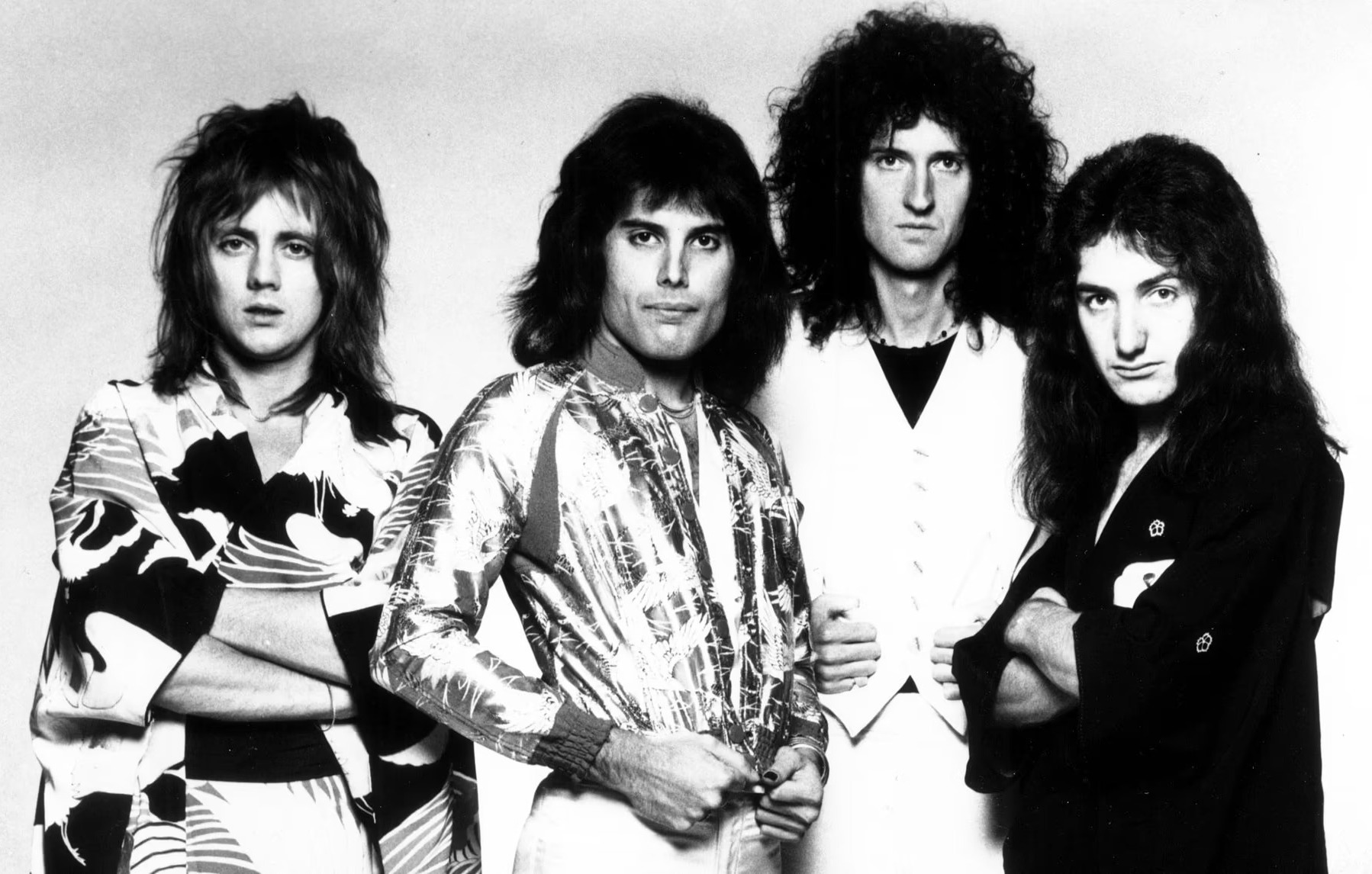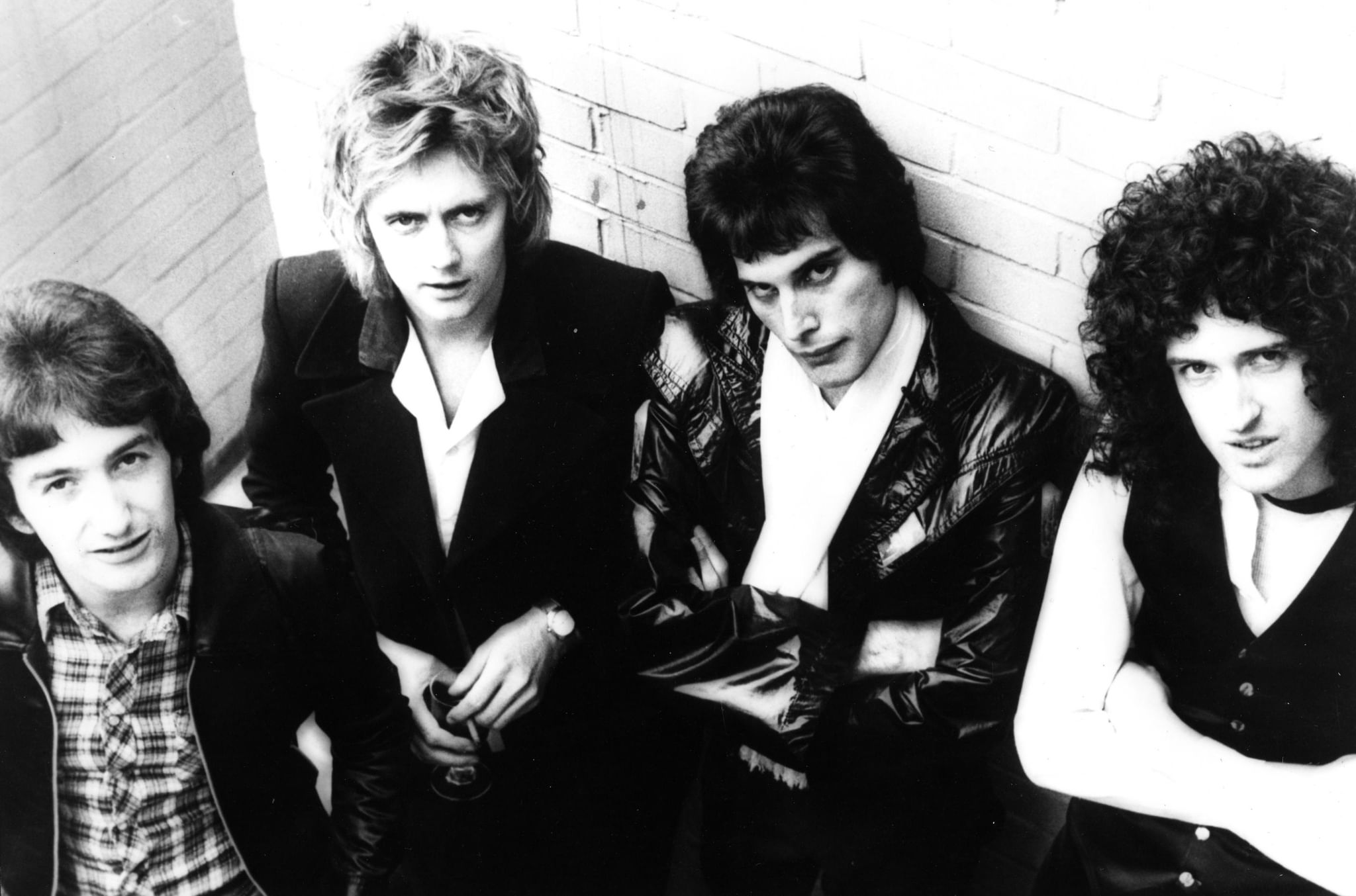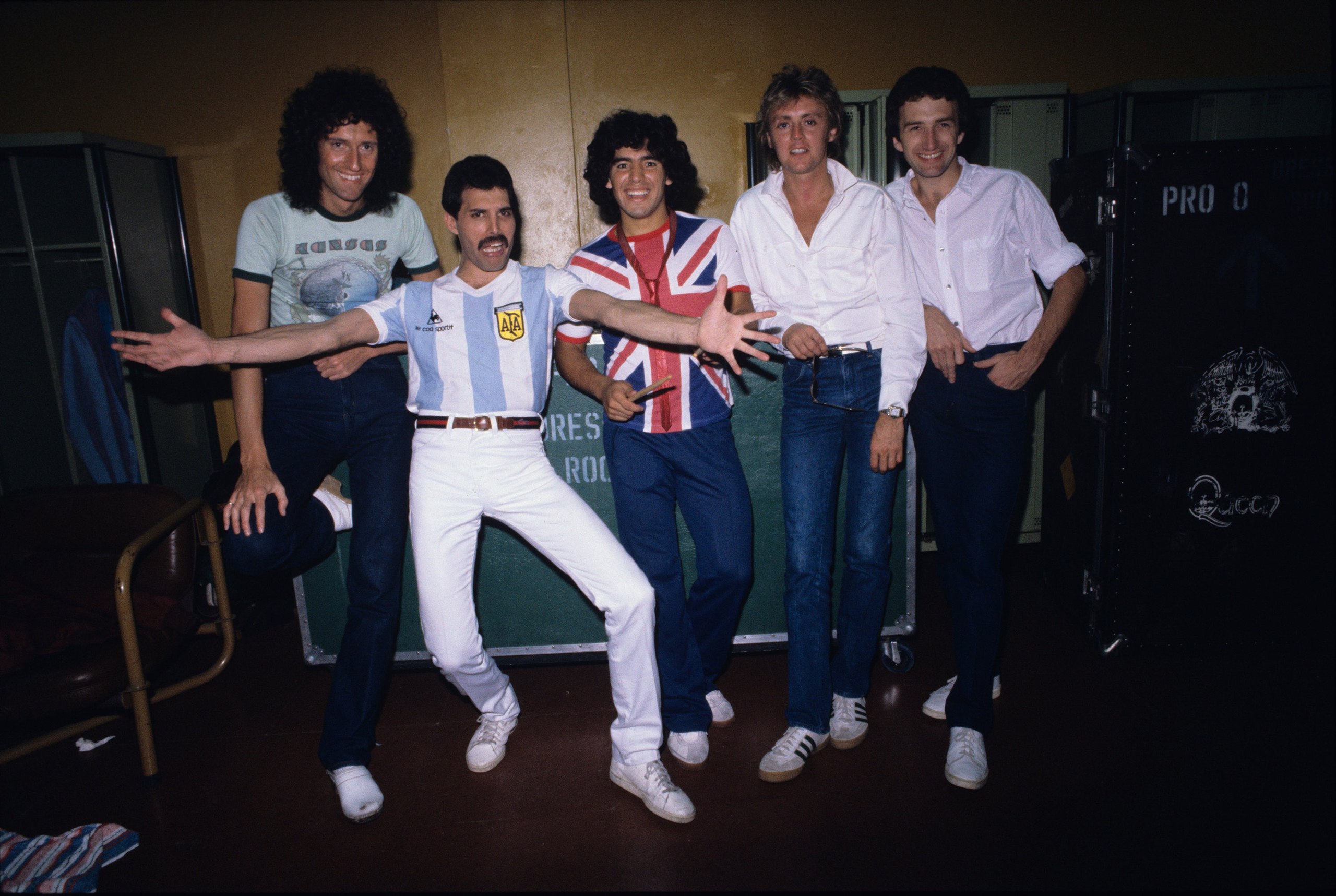Queen is an English rock band fronted by the dynamic and charismatic leader, the late Freddie Mercury. Their brand of pseudo-operatic rock and kitschy style and humor in their songs may not always win the critics’ favor, but they helped the band sell hundreds and millions of records worldwide. “Bohemian Rhapsody” is the band’s trademark song and catapulted Queen into rock immortality. Other well-known hits include “We Are The Champions,” “We Will Rock You,” “Crazy Little Thing Called Love,” and many others
The Founding of the Band
The origins of Queen are found in London, England, from the ashes of the blues-rock band Smile. Would-be Queen members Brian May (guitars/vocals) and Roger Taylor (drums/vocals) were members of that group, with Tim Staffell bassist and lead vocalist. Farrokh (Freddie) Bulsara had been a singer of another band named Wreckage, but had always admired Smile – he was also a friend of Staffell as they had been classmates at Ealing Art College. Soon Bulsara joined Smile as a member after the departure of Staffell, and bestowed a new name on the band, “Queen.”
Farrokh Bulsara also adopted a new stage name, Freddie Mercury, and soon the band recruited a new bassist in John Deacon. Once Queen was complete, they began rehearsing. Over the next couple of years, all four members graduated from college and were ready to focus more on their career as a band.
Band Members
Freddie Mercury (Lead Vocals, Piano): Born Farrokh Bulsara in 1946 in Zanzibar, Freddie Mercury was the flamboyant frontman and primary lyricist of the band. Known for his powerful vocal range and charismatic stage presence, Mercury’s songwriting skills were behind some of Queen’s biggest hits, including “Bohemian Rhapsody,” “Somebody to Love,” and “We Are the Champions.” He passed away in 1991 due to complications from AIDS.
Brian May (Guitar, Vocals): Born in 1947 in Hampton, London, Brian May is the band’s lead guitarist and a key songwriter. He is renowned for his distinctive guitar sound, achieved through his homemade guitar “The Red Special.” May’s contributions to the band’s catalog include hits like “We Will Rock You,” “The Show Must Go On,” and “I Want It All.” He holds a PhD in astrophysics and is also known for his work in this field.
Roger Taylor (Drums, Vocals): Born in 1949 in King’s Lynn, Norfolk, Roger Taylor is the drummer of Queen, known for his high backing vocals and songwriting contributions. He wrote several notable Queen songs, including “Radio Ga Ga,” “A Kind of Magic,” and “These Are the Days of Our Lives.” Taylor’s distinctive sound and energetic performances have been a staple of the band’s identity.
John Deacon (Bass Guitar, Keyboards): Born in 1951 in Leicester, John Deacon joined Queen in 1971 as the bass guitarist. He is the writer of several of Queen’s hits, including “Another One Bites the Dust,” “You’re My Best Friend,” and “I Want to Break Free.” Known for his quiet and reserved personality, Deacon was the perfect foil to the more flamboyant members of the band. He retired from the music industry in the mid-1990s and has since kept a low profile.
Queen’s First Taste of Success
In 1973 Queen released their self-titled debut album which had progressive rock, hard rock and heavy metal influences. It failed to capture the audiences. Their sophomore effort Queen II was a concept album, exploring emotional and fantasy themes. It was an unexpected breakthrough success for the band, thanks to “Seven Seas Of Rhye” which broke into the UK Top 10 in 1974. The success of the single landed Queen a spot to perform on Top Of The Pops. The album peaked at #5 on the UK album charts.
Queen’s third album Sheer Heart Attack (1974) presented a more accessible sound unlike its two predecessors. The album’s single “Killer Queen” landed at #2 on the UK singles charts and also broke into the US Billboard Hot 100 for the first time at #12. The album peaked at #2 on the UK chart while it did well on the US Billboard Hot 100 at #12.
Reaching the Peak of Success and Global Superstardom
The greatest achievement was yet to come for Queen when they released their fourth studio album A Night At The Opera in 1975. The group had recorded it for a long time and spent quite a fortune on it, making it Queen’s most expensive album ever made in their career. The single “Bohemian Rhapsody” alone took three weeks to record. Its mock-operatic musical style carried out by overblown, pompous style was accented by heavy guitar riffs. To help promote the single, Queen created its now-classic music video. The singles’ grandiose formula and the band’s iconic music video helped the single to break into the top 10 US Billboard Hot 100 (at #9) and land at #1 on the UK singles chart that year.
A Night At The Opera became Queen’s first #1 album in Britain, and peaked at #4 on the US album chart, helping to establish Queen as bona fide global superstars.
Queen followed the success of A Night At The Opera with A Day At The Races, which scored another #1 position on the UK album chart, and #5 rank on the US Billboard 200 in 1976. News Of The World (1977) reached platinum status in both US and the UK, helped by the double single “We Are The Champions” and “We Will Rock You.” It was followed by Jazz (1978) which also went into platinum as well.
Because of of the massive success and admiration that Queen had been getting, they were the favorite target of panning from the critics.
Into the 1980s, Queen was at still the peak of their popularity. In late 1980 Queen released their eighth studio album, The Game, which was deemed to be the band’s most eclectic album to date, sampled by the singles “Crazy Little Thing Called Love” (1950s-styled rock and roll) and “Another One Bites The Dust” (with disco influences). These two singles both zoomed to #1 on the US Billboard Hot 100, making The Game Queen’s first and only US #1 album.
Queen also got to tour in such regions as Latin America and Asia, places that most rock groups disregarded. Queen’s subsequent albums Flash Gordon, Hot Space, The Works, A Kind of Magic, The Miracle and Innuendo received lukewarm critical and commercial reception, a signal that Queen was starting to fall out of favor in the US although they were still wildly successful and popular in the UK and much of Europe.
Queens’ Biggest Hits
Queen has a vast catalog of hits that have left an indelible mark on rock music. Here’s a list of some of their major hits, which span a variety of styles and moods, showcasing the band’s versatility and musical genius:
- “Bohemian Rhapsody” (1975): A groundbreaking song featuring an operatic section, rock anthems, and introspective verses. It’s one of Queen’s most iconic tracks and was a chart-topper in multiple countries.
- “Somebody to Love” (1976): This gospel-inspired rock ballad showcases Freddie Mercury’s powerful vocals and the band’s rich harmonies.
- “We Will Rock You” (1977): Known for its stomp-stomp-clap beat, this song is a staple at sports events and a global anthem of defiance and strength.
- “We Are the Champions” (1977): Often paired with “We Will Rock You,” this anthem is a celebration of victory and perseverance, resonating with audiences worldwide.
- “Don’t Stop Me Now” (1978): A high-energy track that has become synonymous with celebration and joy, highlighting Mercury’s dynamic vocal range.
- “Crazy Little Thing Called Love” (1979): A rockabilly-inspired tune that showcases Queen’s ability to cross genres, it became a number-one hit in the United States.
- “Another One Bites the Dust” (1980): Featuring a distinctive bass line by John Deacon, this song became one of Queen’s best-selling singles.
- “Under Pressure” (1981): A collaboration with David Bowie, this song combines a memorable bass riff with profound lyrics about life’s pressures.
- “Radio Ga Ga” (1984): Written by Roger Taylor, this song critiques radio’s decline in the age of television, featuring a catchy chorus and electronic sound.
- “I Want to Break Free” (1984): Known for its iconic music video and message of liberation, this song became an anthem for freedom and expression.
- “A Kind of Magic” (1986): The title track of the album of the same name, it was also featured in the “Highlander” movie soundtrack, showcasing Queen’s ability to blend rock with a more pop-oriented sound.
- “Who Wants to Live Forever” (1986): A haunting ballad from the “Highlander” soundtrack, dealing with the theme of immortality.
- “The Show Must Go On” (1991): Released as Mercury’s health was failing, this powerful track is a testament to his resilience and the band’s dedication to their music.
Freddie Mercury’s Declining Health and Death
By the late 1980s, fans took notice of Mercury’s increasingly pale and sickly appearance and rumors started to swirl around that he had AIDS. At first Mercury tried to deny this, and went on to be active within the band. But Mercury, who was a bisexual, finally admitted on November 23, 1991 that he had AIDS. Within 24 hours after his public confession, Mercury died from respiratory complications brought about by AIDS. He was 45 years old.
Interesting Facts About Queen
Innovative Recording Techniques: For “Bohemian Rhapsody,” Queen used groundbreaking recording techniques, layering vocals and instruments to create a rich, orchestral sound. This process was so complex that the tape reportedly became worn through from overuse.
Freddie Mercury’s Vocal Range: Mercury had a phenomenal vocal range, spanning four octaves. His powerful voice was a key element of Queen’s sound, capable of delivering both hard rock and delicate ballads with equal finesse.
Brian May’s Homemade Guitar: Brian May built his own guitar, known as the “Red Special,” with his father when he was a teenager. The guitar’s unique design and homemade pickups contributed to May’s distinctive, rich tone.
A Band of Graduates: All four members of Queen were highly educated. Brian May has a PhD in astrophysics, Roger Taylor has a degree in biology, John Deacon has a degree in electronics, and Freddie Mercury had a degree in art and graphic design.
“We Will Rock You” and “We Are the Champions”: These two anthems, often played back-to-back, were written to involve concert audiences. “We Will Rock You” was inspired by a moment when the crowd spontaneously sang “You’ll Never Walk Alone” to the band at a gig in Bingley Hall.
The Band’s Logo: Freddie Mercury designed the Queen crest logo using the zodiac signs of the band members: two lions for Leo (Deacon and Taylor), a crab for Cancer (May), and two fairies for Virgo (Mercury). The phoenix symbolizes immortality.
First Rock Band to Release a Picture Disc: Queen was the first rock band to release an album as a picture disc with their album “A Night at the Opera.”
A Band of Songwriters: Unlike many bands where one or two members do most of the songwriting, all four members of Queen wrote hits. Mercury wrote “Bohemian Rhapsody,” May wrote “We Will Rock You,” Deacon wrote “Another One Bites the Dust,” and Taylor wrote “Radio Ga Ga.”
Live Aid Performance: Queen’s performance at Live Aid in 1985 is often hailed as one of the greatest live performances in the history of rock music. The band’s 20-minute set at Wembley Stadium is legendary and was a pivotal moment in their career.
“Bohemian Rhapsody” Twice Crowned UK Number One: “Bohemian Rhapsody” is one of the few singles to have reached number one in the UK twice – first upon its original release and again after Mercury’s death in 1991, showcasing the enduring appeal of Queen’s music.
Queen after Mercury’s Death, Their Impact and Legacy
In 1992, the US hit comedy film Wayne’s World featured “Bohemian Rhapsody” as one of its soundtracks, re-igniting Queen’s popularity among American audiences. The re-released edition of the song went to #2 on the US Billboard Hot 100 that year.
After Mercury’s death, Queen’s surviving members recorded songs from vocal tracks that Mercury had made before his death. The result was 1995’s Made In Heaven, the last album to feature Mercury. While the album received mixed critical reviews, it became a success, having sold four million units in the UK and received a gold certification in the US.
Striving to keep the band active, all members of Queen (save for Deacon, who has now been effectively retired) resumed their positions in the band in 2005, with a new member in Paul Rodgers who now filled Mercury’s shoes as the lead vocalist. It lead the band to be called Queen + Paul Rodgers. Queen celebrated their 40th anniversary in 2011 by releasing their first five albums in the UK and other selected regions. The following year Queen played at the London Olympics’ closing ceremony.
Although Queen may not receive the same critical respect their peers have gotten, the band nevertheless became one of the most successful, dynamic and well-loved bands in the history of 20th century music. They were inducted into the Rock and Roll Hall Of Fame in 2001.



